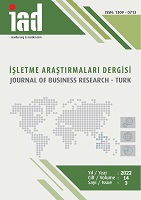Türkiye’de Döviz Kuru Oynaklığı ile Güven Endeksleri Arasındaki İlişki (2012-2021)
The Relationship Between Exchange Rate Volatility and Confidence Indices in Turkey 2012-2021
Author(s): Şerife Gamze AlbayrakSubject(s): National Economy, Business Economy / Management, Financial Markets, Socio-Economic Research
Published by: Orhan Sağçolak
Keywords: Exchange Rate; Real Sector Confidence Index; Consumer Confidence Index; Financial Services Confidence Index;
Summary/Abstract: Purpose – Confidence indices are important indicators which provide useful information on how economic agents will utilize their savings. While the expectations for the future in the economy determine the perspectives of consumers and producers towards the economy, their positive or negative attitudes towards the market are closely related to the changes in macroeconomic indicators. In this context, the aim of the study is to analyze the effect of the exchange rate which has an increasing impact and volatility, on the confidence indices. Design/methodology/approach – In this study, the effects of Turkey's exchange rate fluctuations on the Real Sector Confidence Index, Consumer Confidence Index, and Financial Services Confidence Index were analyzed using monthly data for the 2012:05-2021:12 period. Although there are many studies on the subject in the literature, the study has been consistently carried out with three different confidence indexes, namely the confidence index, in an effort to find the relation between the exchange rate volatility. The exchange rate data is retrieved from the Central Bank of the Republic of Turkey (CBRT) Electronic Data Network System. In order to reach econometrically significant relations between the variables, series should be stationary. The stationary of the series are tested with the Augmented Dickey Fuller Unit Root Test. Since all the series are not stationary at level and they are stationary at different levels, ARDL Bound Test Approach of Pesaran et al. (2001) was employed. Finding – A bidirectional causality relationship between the Consumer Confidence Index and the Dollar/Foreign Exchange Rate, and a oneway causality from the Dollar/Currency Rate to the Real Sector Confidence Index were found. Discussion – Iis of importance in theliterature that the actors involved in the economy are aware of the current situation and future expectations regarding the economy. The concept of trust affects many macroeconomic variables such as the shaping of the economy, investments, employment, andexchange rate. In this context, the Consumer Confidence Index, the Real Sector Confidence Index and the Financial Services Confidence Index prepared by TurkStat are important.
Journal: İşletme Araştırmaları Dergisi
- Issue Year: 14/2022
- Issue No: 3
- Page Range: 2458-2469
- Page Count: 12
- Language: Turkish

